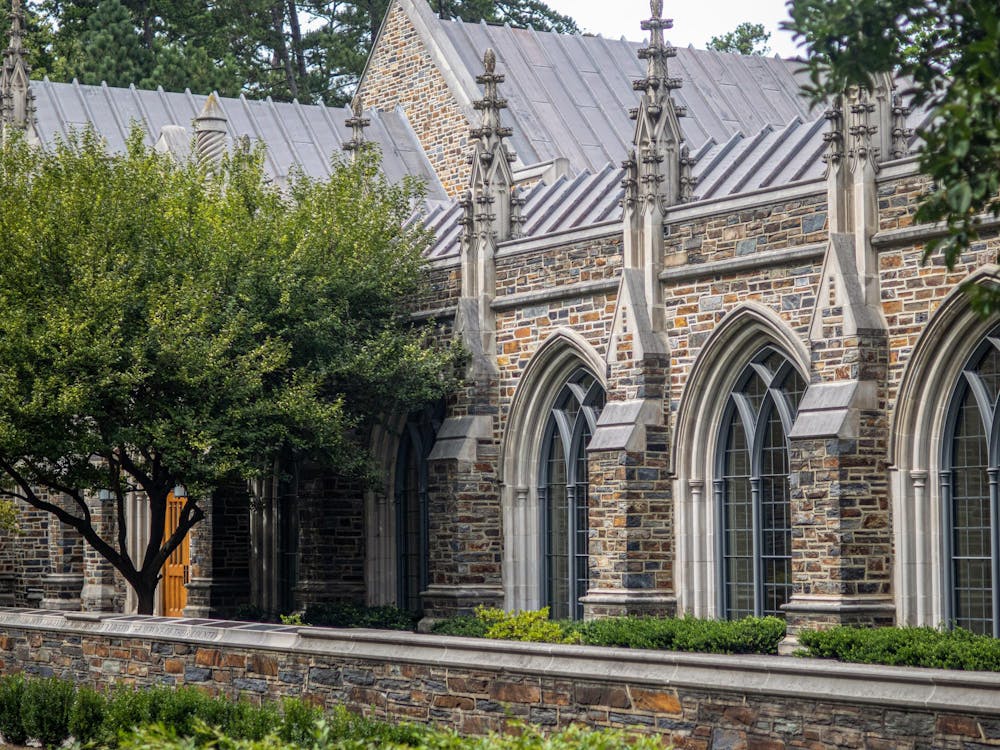Academic Council heard a proposal for a new joint master’s degree between the Fuqua School of Business and Nicholas School of the Environment and announced a new committee to oversee the election of its next chair at its Thursday meeting.
The council also discussed “academic priorities following this month’s presidential election” in a closed session.
New master’s degree
Lori Bennear, professor of environmental economics and policy and interim Stanback dean of the Nicholas School, gave a presentation on a potential new master’s degree in business, climate and sustainability to be taught between Nicholas and Fuqua.
“We think this joint degree is going to allow each school to do what it does best and create something much, much stronger than either of us could do alone,” Frances said.
The 10-month degree program will be led administratively by Fuqua and will follow the typical format of a series of six-week terms beginning in the summer and ending the next spring. The degree is intended for students early in their careers.
“At a very, very high level, business is going to be crucially important for hitting climate goals,” Bennear said. “And what we hear from business loud and clear is that … all sorts of organizations really need entry-level employees who understand that intersection of climate and business.”
Fuqua plans to oversee “business fundamentals” within the curriculum, while the Nicholas School will direct “climate science, policy and economics.”
The program is set to begin with 100 students in the 2026-27 academic year, with the goal of eventually reaching 200 students. The schools intend to balance admissions evenly between domestic and international students, similar to their existing enrollment.
The two schools have secured philanthropic grants worth $2.5 million to fund the program’s launch. They project the program will break even by 2030, earning $2.5 million in annual revenues. According to Interim Fuqua Dean Mary Frances Luce, the schools will likely invest the funds in hiring additional faculty and supporting research efforts.
Attendees raised concerns about the feasibility of a new master’s program in the Nicholas School, given the results of the recent presidential election.
“Let me address the elephant in the room,” said Steffen Bass, arts and sciences distinguished professor of physics. “So, the regulatory environment is about to change drastically, and a lot of companies may thus be compelled to spend a lot less on stuff like environment and sustainability.”
Bennear responded to these comments by noting that the drop in employment of Nicholas School graduates following the 2016 election was not nearly as severe as expected.
“We’ve been here before,” Bennear said. “… People were really worried about what kind of jobs they were going to get. What we saw in those next four years was that we stopped sending students to Washington, D.C.”
She quickly clarified that students “all got great jobs” outside of the federal government, with many hired at the state and local level and others turning to nonprofits and the private sector.
Luce added that businesses face “other sources of constraint” besides the regulatory environment, such as consumer and employee preferences. She speculated that even if environmental policy changes under a Trump administration, corporations may not shift away from their current approach.
A related concern was the proposed split between domestic and international students. Some faculty members in attendance wondered whether changes to immigration laws following the election might make it more difficult to maintain a 50% level of international students, or to promise secure employment to those students once they graduate.
“The federal government might not be feeling quite so friendly towards some of our some of the countries that send us a lot of students, and we recognize that that is a risk, but honestly, we can pivot from this pretty easily,” Bennear said. “It’s going to present a much bigger risk to our existing programs.”
Nominating the next chair
Trina Jones, Jerome M. Culp distinguished professor of law, will complete her term as council chair at the end of June, with her replacement slated to take office July 1. A nominating committee has been constituted to select two candidates, who must be current members of the council, to stand for election for the position.
The nominating committee is composed of Kerry Haynie, professor of political science and of African and African American studies; Karin Reuter-Rice, associate professor in the School of Nursing; Gráinne Fitzsimons, George C. Lamb, Jr. university distinguished professor at Fuqua; Mine Çetinkaya-Rundel, professor of the practice of statistical science; and Don Taylor, professor in the Sanford School of Public Policy. All members are either former council chairs or previously sat on its executive committee.
Jones encouraged her fellow council members to consider running for the position if they are contacted by the committee.
“It is the highlight of my career, one of the highlights of my career, because it gives me this raw view of the University,” she said. “… It can be hard work, but I think it’s important work, and it’s deeply rewarding.”
In other business
The council congratulated senior Jenna Smith for being named a Rhodes Scholar.
The minutes for the council’s Oct. 17 meeting had not yet been published due to staffing shortages and glitches in the recording, so their approval was postponed until the council’s next meeting in December.
Get The Chronicle straight to your inbox
Signup for our weekly newsletter. Cancel at any time.
Darragh Senchyna is a first-year graduate student in The Graduate School and a staff reporter for the news department.

